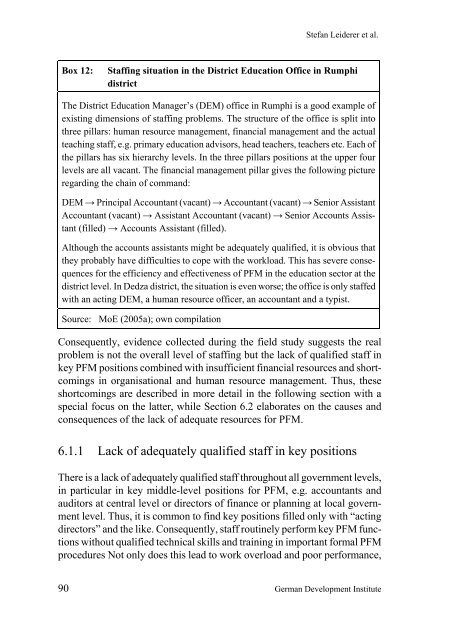Public Financial Management for PRSP - Deutsches Institut für ...
Public Financial Management for PRSP - Deutsches Institut für ...
Public Financial Management for PRSP - Deutsches Institut für ...
You also want an ePaper? Increase the reach of your titles
YUMPU automatically turns print PDFs into web optimized ePapers that Google loves.
Stefan Leiderer et al.<br />
Box 12:<br />
Staffing situation in the District Education Office in Rumphi<br />
district<br />
The District Education Manager’s (DEM) office in Rumphi is a good example of<br />
existing dimensions of staffing problems. The structure of the office is split into<br />
three pillars: human resource management, financial management and the actual<br />
teaching staff, e.g. primary education advisors, head teachers, teachers etc. Each of<br />
the pillars has six hierarchy levels. In the three pillars positions at the upper four<br />
levels are all vacant. The financial management pillar gives the following picture<br />
regarding the chain of command:<br />
DEM → Principal Accountant (vacant) → Accountant (vacant) → Senior Assistant<br />
Accountant (vacant) → Assistant Accountant (vacant) → Senior Accounts Assistant<br />
(filled) → Accounts Assistant (filled).<br />
Although the accounts assistants might be adequately qualified, it is obvious that<br />
they probably have difficulties to cope with the workload. This has severe consequences<br />
<strong>for</strong> the efficiency and effectiveness of PFM in the education sector at the<br />
district level. In Dedza district, the situation is even worse; the office is only staffed<br />
with an acting DEM, a human resource officer, an accountant and a typist.<br />
Source: MoE (2005a); own compilation<br />
Consequently, evidence collected during the field study suggests the real<br />
problem is not the overall level of staffing but the lack of qualified staff in<br />
key PFM positions combined with insufficient financial resources and shortcomings<br />
in organisational and human resource management. Thus, these<br />
shortcomings are described in more detail in the following section with a<br />
special focus on the latter, while Section 6.2 elaborates on the causes and<br />
consequences of the lack of adequate resources <strong>for</strong> PFM.<br />
6.1.1 Lack of adequately qualified staff in key positions<br />
There is a lack of adequately qualified staff throughout all government levels,<br />
in particular in key middle-level positions <strong>for</strong> PFM, e.g. accountants and<br />
auditors at central level or directors of finance or planning at local government<br />
level. Thus, it is common to find key positions filled only with “acting<br />
directors” and the like. Consequently, staff routinely per<strong>for</strong>m key PFM functions<br />
without qualified technical skills and training in important <strong>for</strong>mal PFM<br />
procedures Not only does this lead to work overload and poor per<strong>for</strong>mance,<br />
90 German Development <strong>Institut</strong>e
















